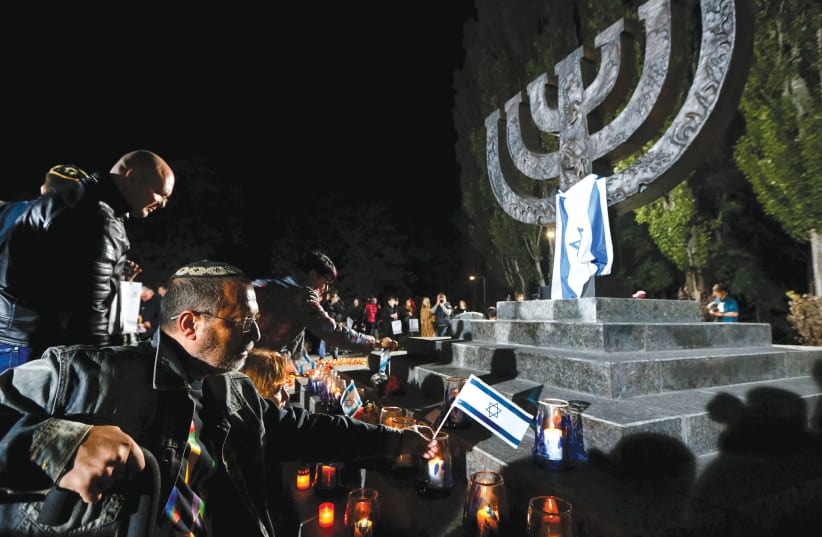A Related Video You May Like:
"I saw that many young intellectuals – who weren’t Jewish - came to listen and talk with others,” Eliezer Lesovoy told The Jerusalem Post last week. “The moment one side is engaged in dialogue with another, there is much hope for the next generation.”Lesovoy a history lecture and a member of TrendVision attended the conference, representing the Jewish Community Center, where he is the educational advisor."This conference is open to the public, not just the Jewish community," Lesovoy commented. "We will be discussing difficult issues, not sticking to simple platitudes. We will talk about the revisionism of the relationship between the Ukrainians and the Jews and the revolution following the current war with Russia. We will discuss how we should teach the topic of memory in schools, in urban planning and in the media. What types of memorials should we build?"Lesovoy touched on recent concerns about antisemitism in Ukraine.“One of the questions we discussed was, what was the role of the Jews in the communist regime which took over the Ukraine, and was this a myth that was created by extreme nationalists that rationalized persecuting Jews?” he said.The current glorification of a number of Ukrainian war heroes such as Symon Vasylyovych Petliura, Stepan Andriyovych Bandera and Bohdan Khmelnytsky greatly angers Ukrainian Jews. These men were war criminals who ruthlessly massacred Jews, and yet statues of them stand in many of the country's squares and many street names were renamed to memorialize them. And now that the country is at war with Russia, these names are being talked about as if they were the Ukraine's greatest heroes."These people committed war crimes. Changing street names to memorialize Ukrainian heroes who murdered Jews is not something we want for the content of our national pantheon,” Lesovoy lamented. “I think we need to create a separation between the country's political agenda and what's taught in history classes. The Ukraine is currently developing a new historical identity following the military struggle with Russia. They are losing 20 soldiers a day, which is in some ways similar to a reality that Israel has to deal with, too, to a certain extent."Conference organizers have proposed creating joint delegations made up of Israelis, Jewish Ukrainians and non-Jewish Ukrainians. They are hoping this will help the younger generation open up new doors, leave behind the generalizations they have always heard, and be willing to face accurate historical facts.One of the reasons why Ukrainians are perceived in Israel as the Jews' most egregious enemies during the Holocaust is a lack of education in the Soviet Union. In addition, the historical narratives from pogroms against Jews that took place in previous periods have been combined with the horrors of the Holocaust.The younger generation of Ukrainians doesn't know much about the Holocaust because the school system doesn’t teach about it. We need to change this.Many Israelis and Jews asked why Babi Yar isn’t properly commemorated in Ukraine, since tens of thousands of Jews were killed there."Babi Yar was not a central topic discussed at the conference," Lesovoy replied. "Nowadays, Babi Yar is a purely political talking point that is not so connected to the Jews. It is used to discuss monetary donations from Russia and that is not what we wanted to focus on at the conference. What we're more interested in discussing is what the younger generation should learn about the Holocaust.”The person who organized the conference was Anna Zharova, the chairperson of the Israel-Ukraine Association. "The idea was born as a continuation of what we began in Israel a few years ago in memory of the Jews murdered in Babi Yar 70 years previously. We brought historians from the Ukraine to Israel and discussed myths about memory and how the last few survivors are quickly leaving this world. Many different organizations have been involved in preparing for the conference.""The question is, How do we keep the memory of the Holocaust alive in our culture?" asks Michael Bogomolny, an architect and educator from Israel. "This isn’t a question just for the Jews, but for the entire Ukrainian society. At our round table session, I asked why this subject was important to the Ukrainian people and people answered that what happened to the Jews is important for our future. The fact that there [are very few] Jews here now affects society. I think that Ukrainians need motivation to talk about this topic. We need to remove the feeling of collective guilt, since they are very sensitive when people say the Ukrainians killed Jews."The organizers of the conference noted that the people who chose to participate in these sessions were full of empathy. When one of the German participants exclaimed, "It's hard for me to be here. I feel like crying," many of those present also became tearful.Translated by Hannah Hochner.
Jews and non-Jews come together in Lvov to promote Holocaust education
The location of the conference was carefully selected - in the outskirts of what used to be the Jewish Ghetto of Lvov, on the railroad tracks that led to the concentration and extermination camps.
